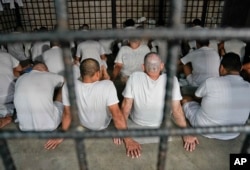A six-month anti-gang sweep across Central America and the United States has netted charges against more than 3,800 members of the violent MS-13 and 18th Street gangs, authorities announced on Friday.
The charges were announced in Miami by acting U.S. Assistant Attorney General Kenneth A. Blanco and the attorneys general of Guatemala, Honduras and El Salvador.
While the vast majority of the charges were brought in El Salvador, MS-13's home turf, officials said more than 70 gang members living in the United States have been indicted in the past six months.
The gang's El Salvador-based "East Coast Program" leader, Edwin Manica Flores, was charged with racketeering in an indictment unsealed in Boston on Thursday. Flores remains in custody in El Salvador.
Rewarding work for prosecutors
MS-13, the only street gang designated by the Treasury Department as a transnational criminal organization, boasts nearly 10,000 members in the United States. Its 18th Street rival has thousands of members and runs cliques in major cities.
President Donald Trump has called MS 13 a “vile criminal cartel” and made fighting transnational gangs a centerpiece of his campaign against illegal immigration.
He has blamed the Obama Administration’s “lax immigration enforcement” for allowing gangs to bring drugs and violence into the United States.
In February, he issued an executive order to "dismantle and eradicate" the transnational gangs. U.S. Attorney General Jeff Sessions has vowed to carry out the order.
"MS-13 is one of the most violent and ruthless gangs in America today, endangering communities in more than 40 states," Sessions said. "But under President Trump's strong leadership, the Department of Justice is taking them off our streets."
The crackdown announced on Friday got under way after Sessions met with his Central American counterparts in March to develop "strategies and concrete plans to give a strong and coordinated response to MS-13's increasingly transnational criminal activities."
"MS-13 coordinates across our borders to kill, rape and traffic drugs and underage girls; we've got to coordinate across our borders to stop them," Sessions said in a statement.
Central American law enforcement officials said their close cooperation with the United States was paying off.
Immigrant youth
"Studying their modus operandi, we realized tackling [the gangs] would require working jointly with the United States, Guatemala and El Salvador," said Honduran Attorney General Chinchilla Banegas. "This approach has allowed us to share information and strike the financial structures of the gangs."
David Pyrooz, an assistant sociology professor at the University of Colorado and co-author of Confronting Gangs: Crime and Community, took issue with the notion that gang violence is being fueled by illegal immigration.
“Immigrant youth are less likely to be in gangs than native-born youth,” Pyrooz said. “The vast majority of gang violence is not conducted by immigrants, legal or illegal.”
Pyrooz said law enforcement officials know they can’t “arrest their way out of the gang problem.”
“Large sweeps like this have been conducted for decades,” he said. “But they are largely trophy arrests. Not a single president in recent memory has 'won the war' on street gangs in the United States, and I don’t suspect the Trump Administration will either.”





